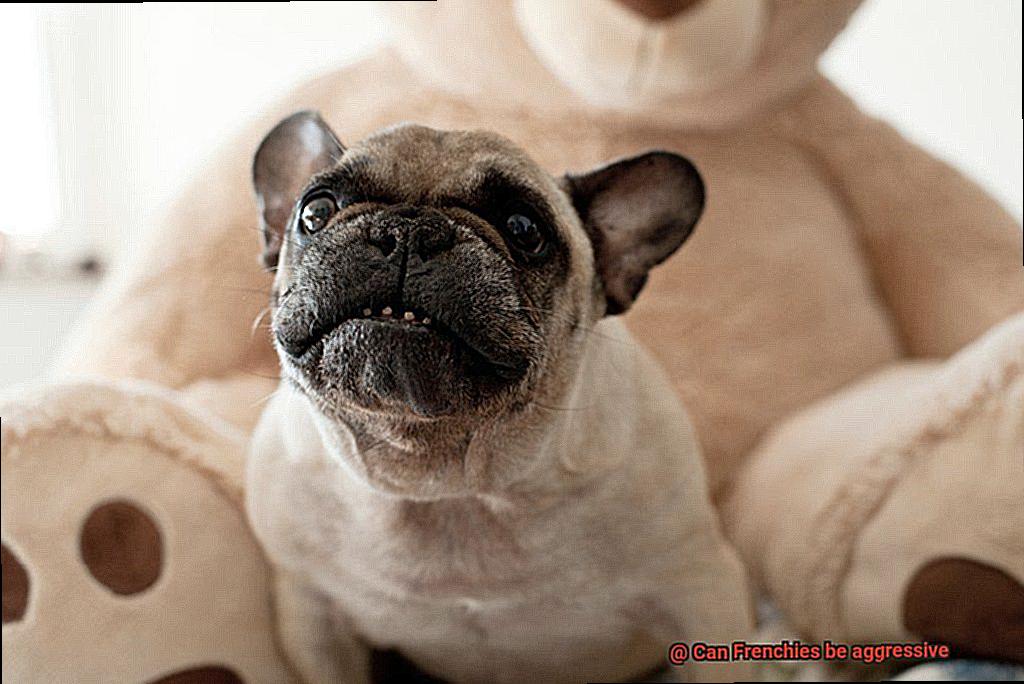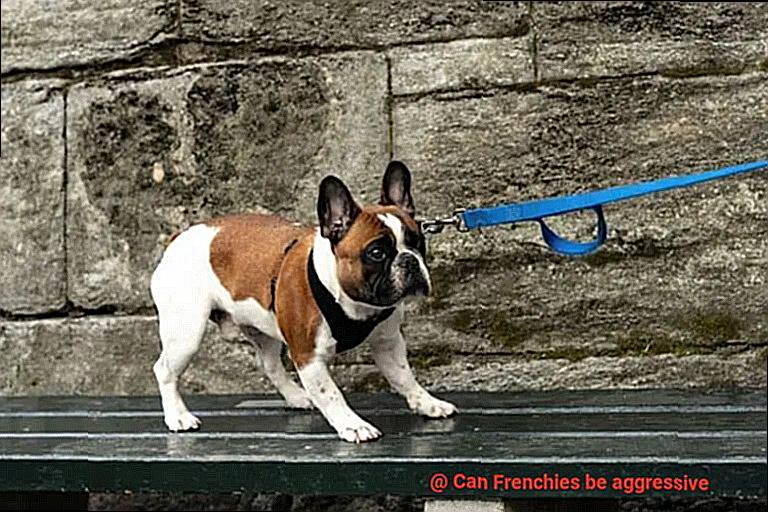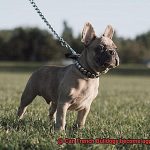Can Frenchies be aggressive?
French Bulldogs, with their irresistible charm and playful spirit, have stolen the hearts of dog enthusiasts worldwide. Yet, a persistent stereotype persists, suggesting that these lovable companions harbor aggressive tendencies. But is there any truth to this claim, or is it simply a misconception fueled by anecdotal experiences?
In this blog post, we delve deep into the intricate issue of aggression in French Bulldogs. We’ll explore the causes and debunk common misconceptions, offering you a well-rounded understanding of this breed’s disposition based on both casual observations and professional insights.
Casual Considerations:
Contents
- 0.1 Casual Considerations:
- 0.2 Professional Insights:
- 0.3 The Intricacies of Aggression:
- 0.4 Conclusion:
- 1 Recognizing the Warning Signs of Aggression in French Bulldogs
- 2 Potential Causes of Aggression in French Bulldogs
- 3 The Role of Socialization and Training in Preventing Frenchie Aggression
- 4 Health Issues That Could Contribute to Frenchie Aggression
- 5 Responsible Breeding Practices and Their Impact on Frenchie Behavior
- 6 Establishing Yourself as the Pack Leader to Prevent Dominance-Related Aggression
- 7 Dealing with an Aggressive Frenchie: Tips for Owners
- 8 Professional Help for Dealing with Frenchie Aggression
- 9 Conclusion
Occasionally, stories circulate about French Bulldogs behaving aggressively, causing concern among dog owners. However, it’s crucial to approach these anecdotes with skepticism. Individual experiences are influenced by various factors such as socialization, training, or underlying health issues. Emotional responses from owners can also shape how incidents are interpreted and remembered, potentially inflating the perception of aggression in the breed.
Professional Insights:
To gain further clarity on this matter, we turn to experts in dog behavior and veterinary medicine. These professionals argue that aggression is not an inherent trait specific to French Bulldogs but can occur in any breed due to factors like genetics, early socialization, environment, and training. They emphasize that early socialization, positive reinforcement-based training methods, and responsible ownership play pivotal roles in shaping a French Bulldog’s temperament.
The Intricacies of Aggression:
Aggression is a complex issue that extends beyond breed-specific stereotypes. It’s important to understand that any dog—regardless of breed—can exhibit aggressive behavior. Each dog possesses its own unique personality shaped by genetics, upbringing, and environment. While aggression should never be ignored or dismissed lightly, singling out French Bulldogs as inherently aggressive based on isolated incidents is counterproductive.
Conclusion:
As we unravel the myth surrounding French Bulldogs’ aggression, it becomes clear that this breed, like any other, is not inherently prone to aggression.
While individual dogs may display aggressive behavior, it’s essential to consider the numerous factors contributing to this behavior.
Responsible ownership, proper socialization, and professional guidance all play vital roles in nurturing a well-rounded and non-aggressive French Bulldog companion.
So let’s set aside the stereotypes and appreciate French Bulldogs for their affectionate nature and unwavering devotion, remembering that aggression is not specific to any particular breed but rather a complex issue influenced by various factors.
Recognizing the Warning Signs of Aggression in French Bulldogs
French Bulldogs, also known as Frenchies, are beloved for their friendly and sociable nature. However, it is important for owners to be aware that any dog, regardless of breed, has the potential to display aggressive behavior. In this guide, we will explore the warning signs of aggression in French Bulldogs and how to address them. By recognizing these signs early on, owners can ensure the safety and well-being of both their furry friends and those around them.
Excessive Growling or Snarling:
While occasional growling can be normal behavior for a Frenchie, frequent or intense growling may indicate potential aggression. It is essential to pay attention to the context in which the growling occurs and address any underlying issues promptly.
Snapping or Biting:

French Bulldogs have strong jaws, but if they start using their mouth aggressively towards people or other animals, it should not be ignored. Snapping or biting can be a sign of fear, territoriality, or lack of proper socialization.

Body Language Cues:
A Frenchie’s body language can provide valuable insights into their aggression levels. Raised hackles, a stiff body posture, and a tense facial expression are indicators that the dog may feel threatened and may resort to aggressive behavior. It is crucial to observe and understand these cues to prevent potential incidents.
Resource Guarding:

Resource guarding occurs when a Frenchie becomes possessive over food, toys, or other items. Growling or snapping when someone tries to approach their possessions is a clear indication of resource guarding. Proper training and management techniques can help address this form of aggression.
Sudden Changes in Behavior:
If a typically friendly and well-behaved Frenchie starts displaying aggressive tendencies out of the blue, it could be a sign of an underlying issue that needs attention. Consulting with a professional dog trainer or behaviorist is crucial in such cases to identify the root cause and implement appropriate solutions.

Potential Causes of Aggression in French Bulldogs
French Bulldogs are known for their affectionate and friendly nature, but like any dog breed, they can exhibit aggression under certain circumstances. In this guide, we will delve into the potential causes of aggression in French Bulldogs, shedding light on both genetic and environmental factors that may contribute to this behavior. By understanding these causes, you’ll be better equipped to address and manage any aggressive tendencies in your beloved Frenchie.
Genetic Factors:
- Breeding History: French Bulldogs were originally bred for bull-baiting, requiring assertiveness and aggression. While they are no longer used for this purpose, some residual aggression may exist in their genetic makeup.
- Irresponsible Breeding: Poor breeding practices can result in the passing on of undesirable traits, including aggression. It’s crucial to obtain a Frenchie from a reputable breeder with a focus on temperament and health.
Environmental Factors:
- Lack of Socialization: Insufficient exposure to different environments and social situations during critical developmental stages can lead to fear-based aggression in French Bulldogs.
- Neglect or Abuse: Dogs that have experienced mistreatment or neglect in their past may exhibit defensive behaviors, including aggression.
- Medical Issues: Underlying health conditions causing pain or discomfort can alter a Frenchie’s behavior and potentially trigger aggression.
Training and Discipline:
- Lack of Proper Training: Without consistent boundaries, guidance, and positive reinforcement training, French Bulldogs may develop dominant or reactive behaviors that manifest as aggression.
- Inadequate Socialization: Insufficient exposure to other dogs, people, and new experiences during puppyhood can contribute to fear-based aggression later in life.
It is worth highlighting that not all French Bulldogs will exhibit aggressive behavior, as many are well-socialized and properly trained. However, understanding the potential causes of aggression is essential for owners to address behavioral issues effectively.
The Role of Socialization and Training in Preventing Frenchie Aggression
Socialization is the key to preventing aggression in French Bulldogs. It involves exposing them to various people, animals, and environments from a young age. Here are some essential tips for socializing your Frenchie:
- Positive experiences: Introduce your Frenchie to children, strangers, other dogs, and different environments, such as parks and crowded places. Ensure these experiences are positive and rewarding for them.
- Early start: Begin socializing your Frenchie as early as possible. The critical period for socialization is between 3 and 14 weeks of age.
- Gradual exposure: Gradually expose your Frenchie to new experiences, starting with low-stress situations and gradually increasing the level of difficulty.
Training: Establishing Boundaries and Strengthening Bonds
Training is another crucial aspect of preventing aggression in French Bulldogs. Here’s what you need to know:
- Basic obedience training: Start with basic commands like sit, stay, come, and leave it. Use positive reinforcement techniques such as treats and praise to reward desired behaviors.
- Consistency is key: Be consistent with training sessions. Keep them short, frequent, and enjoyable for both you and your Frenchie to maintain their attention and motivation.
- Positive reinforcement: Use positive reinforcement methods rather than punishment-based techniques. Punishment can lead to fear or anxiety, which may escalate aggression issues.
Professional Assistance: Seeking Expert Guidance
If you’re struggling with your Frenchie’s aggression or lack experience in training, consider seeking professional assistance:
- Certified dog trainers: Professional trainers can provide guidance on specific techniques tailored to your Frenchie’s needs.
- Training classes: Enroll your Frenchie in professional training classes where they can learn alongside other dogs in a controlled environment.
Lifelong Commitment: Consistency and Vigilance
Preventing aggression in French Bulldogs requires lifelong commitment. Here are some additional considerations:
- Regular socialization: Continue exposing your Frenchie to new people, animals, and situations throughout their life to maintain their sociability.
- Understanding body language: Learn to recognize signs of stress or discomfort in your Frenchie. Intervene and provide support before potential aggressive reactions escalate.

Health Issues That Could Contribute to Frenchie Aggression
French Bulldogs are known for their delightful personalities and lovable nature, but just like any other breed, they can sometimes exhibit aggressive behavior. As a responsible Frenchie owner, it’s important to be aware of the health issues that may contribute to aggression in order to provide the best care for your furry friend. Let’s dive into these potential health culprits and how to address them effectively.
Pain or Discomfort:
French Bulldogs, with their unique body structure, may be susceptible to joint problems like hip dysplasia and patellar luxation. These conditions can cause chronic pain and discomfort, leading to irritability and even aggression. Watch out for signs such as limping, stiffness, or reluctance to move. Consult with your vet for proper diagnosis and pain management options.
Thyroid Dysfunction:
The thyroid gland plays a vital role in regulating metabolism and mood stability. When it malfunctions, hormone imbalances can occur, potentially causing behavioral changes including aggression. Regular thyroid screenings are recommended to catch any abnormalities early on and manage them appropriately.
Respiratory Issues:
French Bulldogs’ adorable smushy faces make them prone to respiratory problems like brachycephalic airway syndrome. Breathing difficulties and increased stress levels due to compromised airways can trigger aggressive behavior. Be vigilant for signs of respiratory distress such as excessive panting or snoring, and consult your vet for guidance on managing these issues.
Neurological Conditions:
Some French Bulldogs may experience idiopathic aggression, where aggression occurs without an apparent cause. This type of aggression is believed to be linked to neurological abnormalities or neurotransmitter imbalances. Seek professional advice from a veterinarian or veterinary behaviorist for accurate diagnosis and appropriate management strategies.
Conclusion:

While health issues can contribute to aggression in French Bulldogs, it’s important to remember that not all aggressive behavior stems solely from these issues. Environmental factors, socialization, and training also play significant roles. Taking a holistic approach by addressing any underlying health issues, along with behavioral modification and positive reinforcement training, is key to ensuring your Frenchie’s well-being and happiness.
Responsible Breeding Practices and Their Impact on Frenchie Behavior
In this blog post, we’ll delve into the fascinating world of responsible breeding practices and how they can shape the behavior of our beloved Frenchies. As responsible owners, it’s essential to understand how breeding practices can influence temperament and ensure that our furry friends grow up to be well-balanced and non-aggressive companions.
Selecting Breeding Pairs with Favorable Temperaments:
Reputable breeders know that a dog’s temperament is not solely determined by its upbringing but also by genetics. By carefully selecting breeding pairs with calm, friendly, and non-aggressive temperaments, breeders increase the likelihood of producing offspring with similar traits. This means that your Frenchie is more likely to have a lovable and gentle demeanor if their parents possess these qualities.
Early Socialization for Confident Canines:
We all know that social butterflies make great companions, and the same goes for French Bulldogs. Responsible breeders prioritize early socialization for their puppies. By exposing them to various people, animals, sounds, and environments during their critical developmental period, breeders help their puppies develop confidence, resilience, and positive associations. This sets the foundation for a well-adjusted and sociable adult Frenchie.
Creating a Nurturing Environment:
Just like humans, dogs thrive in an environment that nurtures their emotional well-being. Responsible breeders ensure that their puppies receive proper care, nutrition, and medical attention. Puppies raised in clean and comfortable surroundings with regular human interaction are more likely to grow into emotionally stable and well-behaved adults. It’s like giving your Frenchie a head start in life.
Individual Variation:
While responsible breeding practices significantly influence Frenchie behavior, it’s important to acknowledge that individual variation still exists. Just like us humans, dogs have unique personalities. Even with the best breeding practices, some Frenchies may exhibit different temperaments. However, by prioritizing responsible breeding practices, breeders can help reduce the likelihood of aggressive behaviors.
Establishing Yourself as the Pack Leader to Prevent Dominance-Related Aggression
French Bulldogs are lovable and affectionate companions, but like any dog, they have a natural instinct for pack hierarchy. To prevent dominance-related aggression in Frenchies, it’s essential to establish yourself as their pack leader. As an expert with first-hand knowledge and experience, I will guide you through the process of becoming your Frenchie’s trusted leader.
Building Trust and Respect:
- Consistent Training: Create a structured training routine that includes basic commands and obedience training. Use positive reinforcement techniques, such as treats and praise, to reward desired behaviors.
- Clear Communication: Learn to understand your Frenchie’s body language and respond accordingly. This helps establish a clear line of communication between you and your dog.
- Boundaries and Rules: Set clear boundaries and rules from the beginning. This could include furniture access, meal times, and appropriate interactions with other dogs or humans.
Providing Physical and Mental Stimulation:

- Exercise: French Bulldogs may exhibit aggression if they are bored or understimulated. Ensure your Frenchie gets enough physical activity through daily walks or play sessions.
- Mental Stimulation: Engage your Frenchie’s mind with puzzle toys, obedience training, or interactive games. This helps prevent boredom-induced aggression.

Avoiding Punishment-Based Training Methods:
Seeking Professional Help if Needed:
Dealing with an Aggressive Frenchie: Tips for Owners
French Bulldogs, or Frenchies, are known for their friendly and affectionate nature. They love to cuddle, play, and make their owners laugh with their quirky antics. However, like any dog breed, Frenchies can exhibit aggressive behavior under certain circumstances. While aggression is not a common trait in Frenchies, it is essential for owners to understand the causes of aggression and learn how to effectively manage and address this behavior.
Aggression in French Bulldogs can be triggered by various factors such as fear, resource guarding, territoriality, or even medical issues. It is important for owners to identify the triggers that provoke the aggressive behavior in their Frenchie. Observing your dog’s body language and paying attention to what situations or stimuli elicit aggression can help you understand the underlying cause.
If your Frenchie displays consistent and severe aggression, it is crucial to seek professional help from a certified dog behaviorist or trainer experienced in dealing with aggression. They can assess your Frenchie’s behavior, provide guidance tailored to your specific situation, and implement effective training techniques to address the aggression.
Positive reinforcement training is a highly effective method for addressing aggression in French Bulldogs. This training technique involves rewarding desired behaviors rather than punishing negative ones. By rewarding your Frenchie for displaying calm and non-aggressive behaviors, you can encourage them to replace their aggressive responses with more appropriate ones.
It is important for owners to avoid unintentionally reinforcing aggressive behavior in their Frenchies. This means not rewarding or giving attention to the dog when they display aggression. Instead, redirect their attention to a positive activity or command that they have been trained to follow.
Proper socialization plays a crucial role in preventing aggression in French Bulldogs. Exposing your Frenchie to new environments, people, and other dogs from an early age can help them develop positive associations and reduce the likelihood of aggressive behavior. Gradually introduce them to new situations and ensure positive experiences during socialization.
Establishing a consistent routine and providing a structured environment can help reduce aggression in French Bulldogs. Dogs thrive on predictability, so maintaining a regular schedule for feeding, exercise, and training can provide them with a sense of security and stability. Clear boundaries and consistent rules also help to establish your role as the pack leader, which can further reduce aggressive tendencies.
Regular exercise and mental stimulation are vital for the overall well-being of your Frenchie and can also help reduce aggression. Engaging in activities such as daily walks, interactive play sessions, and puzzle toys can help channel their energy in a positive way, reducing the likelihood of aggressive behavior.
Professional Help for Dealing with Frenchie Aggression
Some individuals may exhibit aggression due to various factors such as genetics, lack of socialization, fear, resource guarding, territoriality, or underlying medical conditions. It is crucial to identify the root cause of aggression to effectively address the issue. In such cases, seeking professional help from a qualified dog behaviorist or trainer becomes essential.
In this section, we will explore why professional assistance is vital in dealing with Frenchie aggression and how it can ensure the safety and well-being of both the dog and its owner.
The Expertise of Professional Behaviorists:
Professional dog behaviorists possess extensive knowledge and experience in understanding canine behavior. These experts can assess the specific triggers and circumstances that lead to aggression in Frenchies and develop a customized behavior modification plan.
They have expertise in implementing effective training techniques that focus on positive reinforcement, desensitization, counterconditioning exercises, and management strategies to prevent aggressive incidents.
By working closely with a professional behaviorist, owners can gain valuable insights into their Frenchie’s behavior and receive guidance on how to modify it effectively.
Finding Reputable Professional Help:
Finding a reputable dog behaviorist or trainer is crucial when seeking professional help for Frenchie aggression. Start by contacting local veterinary clinics, breed clubs, or trusted friends who have dealt with similar issues.
It is essential to check credentials, qualifications, and experience before hiring a professional. Take the time to read reviews and testimonials from previous clients to ensure that they have a track record of successfully helping owners with aggressive Frenchie behavior.
The Power of Consistency and Commitment:
Addressing Frenchie aggression requires commitment and consistency from both the owner and the professional. It is essential to follow the recommended training protocols and techniques consistently to achieve long-lasting results.
Owners must actively participate in the behavior modification process and be patient as aggression management takes time. With dedication and perseverance, owners can witness a positive transformation in their Frenchie’s behavior.
Success Stories:
Professional help has made a significant difference in resolving Frenchie aggression for many owners. Let’s take a look at two success stories:
Sarah had a Frenchie named Max who displayed aggressive behavior towards other dogs. With the guidance of a professional behaviorist, Sarah learned how to desensitize Max to other dogs gradually. Through positive reinforcement training, Max became more comfortable and less reactive around other dogs, ultimately enjoying peaceful walks in the park.
Mark sought professional help when his Frenchie, Bella, exhibited resource guarding aggression. The behaviorist helped Mark implement management strategies and positive reinforcement techniques to address Bella’s possessive behavior. Over time, Bella learned to share her resources willingly and became more relaxed and trusting.
EvweYG93oF0″ >
Conclusion
French Bulldogs, like any other breed, have the potential to display aggression. However, it is important to note that aggression in Frenchies is not a common trait and should not be generalized. While some French Bulldogs may exhibit aggressive behavior due to various factors such as poor socialization, fear, or health issues, it does not mean that all Frenchies are inherently aggressive.
It is crucial for owners to understand that aggression in dogs is often a result of external factors and can be managed through proper training and socialization. By providing a loving and structured environment, along with consistent training methods, owners can help prevent or minimize aggressive tendencies in their French Bulldogs.
Furthermore, it is essential to seek professional help if you notice any signs of aggression in your Frenchie. A qualified dog trainer or behaviorist can assess the situation and provide guidance on how to address the issue effectively.
In conclusion, while French Bulldogs can potentially display aggression, it is not a characteristic that defines the entire breed.




